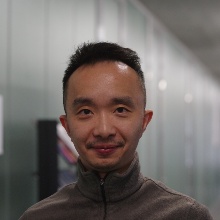Contact
Pfaffenwaldring 5a
70569 Stuttgart
Room: 2.01
2025
- Becker S, Dang TT, Wei R, Kappler A. Evaluation of Thiobacillus denitrificans’ sustainability in nitrate-reducing Fe(II) oxidation and the potential significance of Fe(II) as a growth-supporting reductant. FEMS Microbiol. Ecol. [Internet]. 2025 Apr;101. Available from: https://doi.org/10.1093/femsec/fiaf024
- Wei R, Le AV, Liu B, Azari M, Nowak W, Kappler A, et al. Modeling the Ammonium Removal Processes in Household Sand Filters. In: Geophys. Res. Abstr. Vienna: EGU General Assembly 2025; 2025.
2023
- Bayer T, Wei R, Kappler A, Byrne JM. Cu(II) and Cd(II) Removal Efficiency of Microbially Redox-Activated Magnetite Nanoparticles. ACS Earth Sp. Chem. 2023 Oct;7:1837–47.
2022
- Wei R, Escher BI, Glaser C, König M, Schlichting R, Schmitt M, et al. Modeling the Dynamics of Mixture Toxicity and Effects of Organic Micropollutants in a Small River under Unsteady Flow Conditions. Environ. Sci. Technol. 2022 Sep;56:14397–408.
2021
- Wei R. Modeling combined with fieldwork on surface water quality: the sources and fate of mixture effects under unsteady flow. In: Integrated Hydrosystem Modeling Conference. Tübingen, Germany: Integrated Hydrosystem Modeling Group; 2021.
- Schmitt M, Wack K, Glaser C, Wei R, Zwiener C. Separation of photochemical and non-photochemical diurnal in-stream attenuation of micropollutants. Environ. Sci. Technol. 2021 Jun;55:8908–17.
07/2011 B.Sc. Environmental Engineering, Hunan Agricultural University, China
03/2012 Exchange Environmental Engineering, Wrocław University of Environmental
and Life Sciences, Poland
05/2018 M.Sc. Environmental Engineering, University of Colorado Boulder, U.S.A
Since 09/2018 Ph.D. Candidate, Geoscience / Research Training Group ‘Integrated
Hydrosystem Modeling’, University of Tübingen
Since 03/2024 Postdoc, Institute for Modelling Hydraulic and Environmental
Systems, University of Stuttgart
Surrogate modeling
Bayesian inference and calibration
Active learning
Reactive transport models
Machine learning for scientific computing


